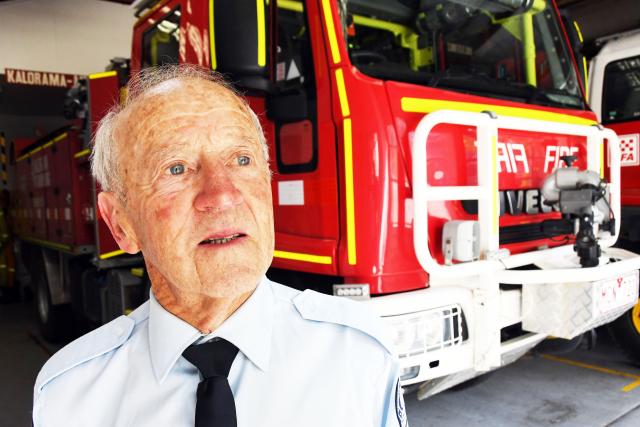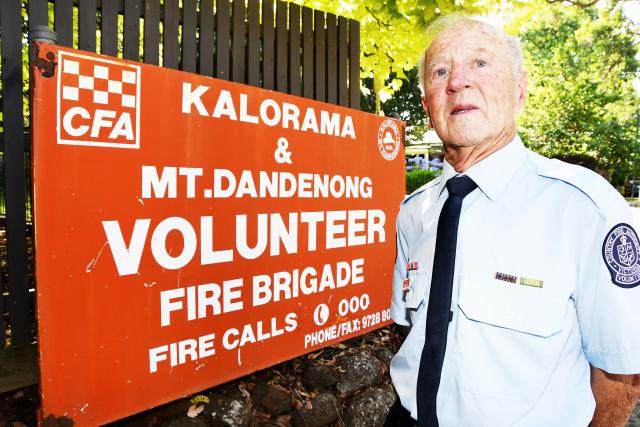
By Tyler Wright
On 16 February 1983, then deputy officer in the Dandenong Ranges CFA group, Herb Detez, was prepared for a challenging high fire danger day.
Ash from Mount Macedon and Woodend areas were falling around the outer east of Melbourne in the early morning.
“The forecast was fairly benign even though a few days before there’d been some pretty bad fires,” Mr Detez said.
Also principal of Coldstream Primary School at the time, Mr Detez noticed the north wind gusting as he made his way to the school.
At around 2pm, Mr Detez noticed smoke becoming visible from the south west of Upwey while driving to his two hour shift at the CFA’s watch room in Belgrave.
“Mount Morton Road runs a long part of the edge of what is now Birdsland, and it was growing very quickly,” he said.
“The group officer got another deputy and they took off down Belgrave-Hallam Road to find out exactly what the situation was, which was a good move, but by the time they got down to Wellington Road they had to duck because the fire was coming so quickly.”
The Dandenong Ranges group’s forward control centre was set up out of a caravan at Belgrave South Primary School, where Mr Detez would advise firefighting crews on the ground at the blaze.
“They knew that all that the eastern flank from where the fire started until all the way down to Wellington Road was going to become the firefront, and so we were there to control the fire as it developed and as things evacuated.
“That involved trying to keep a track on where vehicles were, to track telephone calls and also to get information on the progress of the fire back to the control at Belgrave.”
From the watch room, the crew would send messages out to firefighters.
“The first one was to broadcast the impending arrival of the wind change, which was going to be quite horrific,” Mr Detez said.
“The second one was to get as many units who could be spared across to the eastern side of the fire.
“By this time we had had a lot of support coming in from other brigades, other groups, other regions… however many units turned out to the eastern flank, I have no idea.”
With radio frequencies only extending to the Dandenong Ranges Group’s immediate area, Mr Detez wasn’t to know how far the blaze had gone.
“Mount Morton Road was the fuse that carried that fire all the way down into the southern parts of the area… there was a coronial inquiry because there were other fires as well that we didn’t know anything about in our communications van, we didn’t know anything about Cockatoo.
“I still do not know how I managed to control the fire before it got into Selby, before it got into Kallista or any of those places,” he said.
The Upper Beaconsfield and Belgrave Heights areas were severely impacted by the Ash Wednesday bushfires as the blaze travelled south, resulting in deaths in Cockatoo and Upper Beaconsfield.
“We were all torn apart by it,” Mr Detez said.
“Too many people died that day and it should not have happened, but it was beyond the scope of the CFA to do any better than they did.
“Their hands were tied, there was too much fuel around and there shouldn’t have been.”
Still involved in the CFA as a non-operational member for the Kalorama Mount Dandenong Fire Brigade, Mr Detez said things have changed over the past 40 years.
“The most significant thing is a greater awareness in the community of the need for fire prevention,” he said.
“[And] the rapid changes in communication and technology; we were working on telephone landlines in those days, nowadays it’s all done by mobile phones.
“I don’t know that we’re any more responsive to the likelihood or the turnout of fire, but it’s certainly much more effective.”
Those finding themselves experiencing strong emotions around Ash Wednesday are advised to contact Lifeline on 131114 or Beyond Blue on 1300 224 636 which offer support services nationwide.
CFA members and their families can also contact the CFA Wellbeing Support Line for free, confidential 24/7 access to psychologists, counsellors, peers and chaplains.







